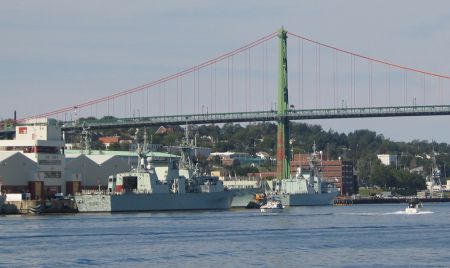In April, Lockheed Martin announced it would be growing its operations in Halifax, creating 100 new jobs over the next five years. The announcement was hailed by Nova Scotia Premier Rodney MacDonald as "further proof of Nova Scotia's reputation as a destination of choice for the world's best companies."
Lockheed is one of the world's largest weapons manufacturers, reporting sales of $42.7 billion last year. The province, through Nova Scotia Business Inc (NSBI), is supporting its expansion with a $1.8 million payroll rebate.
"It's frightening when you have a company doing as well as Lockheed and they're getting tax breaks," says Heidi Verheul, a member of the Halifax Peace Coalition (HPC), an organization speaking out against Lockheed's expansion and payroll rebate. "We should be investing in more sustainable industries," she adds.
NSBI is not in the business of sustainability, however, but of increasing economic activity in the province. And industries like defence and aerospace contribute $1.5 billion to the provincial economy each year and provide jobs with $70,000 annual salaries, says Sarah Levy of NSBI. "You can't argue with numbers like that."
But Verheul says it's unethical for the province to support companies like Lockheed. "This is a company that earned over $3 billion in profit last year from war. It should not be getting government handouts. Its hellfire missiles are used to kill people in the Middle East."
HPC member Tamara Lorincz adds that its the choices and policies of the provincial and federal government that help make weapons manufacturers so profitable.
A year ago, the Harper government unveiled the Canada First Defence Strategy, which commits to raising defence funding from $18 billion in 2008-09 to over $30 billion in 2027-28. In total, the government plans to invest close to $490 billion in defence over a 20 year period.
The move is an obvious boon for weapons manufacturers who will profit from large contracts with the Canadian military. In November, a Lockheed Martin-led team was awarded a $2 billion contract for the installation, integration and long-term in-service support of a new combat system for 12 of the Canadian Navy's frigates, or warships.
When announcing the new jobs in Nova Scotia, Tom Digan, president of Lockheed Martin-Canada, stated that, "an expansion in Halifax simply makes sense."
Nova Scotia is home to approximately 40 per cent of all Canadian military assets. Operating in Halifax provides a "proximity to clients," says Levy, an advantage that NSBI highlights on its website.
Indeed, one of Lockheed Martin's offices in Halifax is inside the Canadian Forces base. The company has a 25 year ongoing relationship with the Canadian Navy, says Levy - a relationship Lockheed refers to as a "25 year legacy."
Lorincz does not support the Canadian military having such cozy relations with Lockheed. She points out that Norway's government pension fund divested itself of its shares in Lockheed because the company's activities as a weapons manufacturer are considered in breach of its ethical guidelines. Lorincz adds that no socially responsible investment (SRI) fund will invest in weapons manufacturers either.
"If it's not ethical for Norway. If it's not ethical for SRI. Why are we doing this?" she asks.
Lockheed isn't the only weapons manufacturer to see the advantage of locating in Halifax. L-3 Electronic Systems, General Dynamics and Xwave also have offices in the city.
"We're not opposed to the workers," says Verheul. "People need to feed their families. We want to see more sustainable industries supported."
"Jobs to make combat systems are not the kind of jobs that we need," echoes Kaleigh Trace, a Dalhousie University student and a member of the Student Coalition Against War (SCAW). In February, SCAW protested Lockheed's presence at a Dalhousie career fair. "The government should be supporting companies involved in the green economy and investing more in education, not supporting a weapons industry," she says.
While the Canadian and provincial government invest in weapons and defence, Lorincz points out that the "real enemies" are going unnoticed. "We're facing real threats like climate change," she says, but the same year the federal government spend $18 billion on defence, $1.5 billion was spend on environment.
"When we ask Canadians what their priorities are, they say health and the environment," says Lorincz. She points to a 2005 poll done by the Centre of Research and Information that found the top three program priorities for Canadians are protecting the environment (78 per cent), spending more on health care (74 per cent) and spending more on education and training (73 per cent). She would like to see the federal and provincial government shift their priorities accordingly. "Let's get people working on solar and renewable energy."



